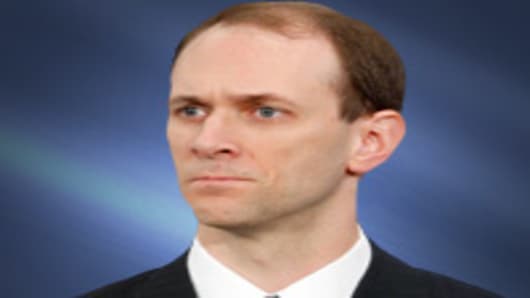President Obama on Friday will promote a longtime economic adviser, Austan D. Goolsbee, to chairman of his Council of Economic Advisers, signaling continuity even as a high unemployment rate has left much of the public dissatisfied with administration policies.
Mr. Obama’s decision to elevate Mr. Goolsbee, a left-of-center economist, to succeed Christina D. Romer, who returned this month to the University of California, Berkeley, is part of a broader flux within the White House economic team, as architects of the government’s response to the worst recession in 80 years begin moving up and out and their roles shift.
Mr. Goolsbee has been serving as a member of the three-person advisory panel since the beginning of the Obama administration.
No other major changes are expected, officials say, reflecting a theme the president sounded on Wednesday in an economic address near Cleveland, that the country should “keep moving forward with policies that are slowly pulling us out.”
Republican leaders in Congress, and a few endangered Democrats seeking to distance themselves from the White House before the midterm elections, have called for Mr. Obama to fire his top advisers, including the Treasury secretary, Timothy F. Geithner. But Mr. Geithner, who did not know Mr. Obama previously, has become one of the president’s most trusted advisers, credited with successfully managing the financial bailout and recovering most of the taxpayers’ money. He is expected to remain for some time.
Asked on PBS’s “NewsHour” this week about the calls for him to be fired, Mr. Geithner quipped, “It’s an old idea. A lot of people have had it, and my wife had it first, I think.” He added, “I’m going to do this as long as the president asks me to do it.”
Similarly, Lawrence H. Summers, the director of the White House National Economic Council, is not expected to leave soon, officials say, despite his history of run-ins with other advisers, and Mr. Obama’s occasional impatience with the policy vetting process that Mr. Summers oversees.
Mr. Obama and the other advisers nonetheless value Mr. Summers’s contributions as a renowned economist and former secretary of the Treasury in the Clinton administration, these officials say.
Yet the other two principals in Mr. Obama’s economic inner circle — Ms. Romer and Peter R. Orszag, his budget director — left in recent weeks, largely for personal reasons, giving Mr. Obama the opening to remake his team. But for both vacancies, Mr. Obama has now picked people from within his administration.
To succeed Mr. Orszag, who left in July, the president nominated Jack Lew, who has been a deputy secretary of state and was a budget director in the Clinton administration. Mr. Lew is not on the job yet but is awaiting confirmation by the Senate.
Because Mr. Goolsbee has been confirmed by the Senate as a member of the Council of Economic Advisers, he does not need approval to become the chairman — not a small consideration at the White House, given how often the president’s nominees become bogged down in partisans skirmishes.
Another factor initially worked against Mr. Goolsbee’s elevation — his sex — and that also played a part in his being passed over for the chairman post at the start of the administration. Ms. Romer was the only woman among Mr. Obama’s top economic advisers, and administration officials considered whether to name a woman to replace her.
Also, at 41, Mr. Goolsbee would be the youngest chairman since Arthur M. Okun held the job from 1968 to 1969 under President Lyndon B. Johnson. (Mr. Okun is known for Okun’s Law, which describes the relationship between changes in employment and changes in output.)
But Mr. Goolsbee, an amateur comic as well as an economist, was a favorite within the White House, where many colleagues felt he had earned the chairmanship. He has tense relations with Mr. Summers, however, after policy disputes in the early crisis-driven debates over the rescues of the financial industry and Chrysler, among other issues.
Mr. Goolsbee, who has a free-market bent, opposed bailing out Chrysler. He did not prevail, but Mr. Obama personally sought his arguments.
The Council of Economic Advisers traditionally provides analysis of the economy and of the potential economic impact of proposed policies. But because the office is largely divorced from politics and located in a building separate from the White House, many past chairmen have had limited influence. Ms. Romer, however, was routinely included in the West Wing deliberations of the last 20 months, and Mr. Goolsbee is likely to be as well.
And unlike Ms. Romer or most past chairmen, Mr. Goolsbee has a previous, friendly relationship with the president. Mr. Goolsbee was an economics professor at the University of Chicago when Mr. Obama taught at its law school. He provided economic advice when Mr. Obama ran for the Senate and for president.
Mr. Goolsbee was at the center of a controversy during the Democratic race for the presidential nomination when it was reported that he had told a Canadian official in Chicago that Mr. Obama’s protectionist campaign talk was “more reflective of political maneuvering than policy” he would support as president. While Mr. Goolsbee denied the account, as an economist he does espouse a free trade philosophy.
Mr. Goolsbee has also been the staff director of the President’s Economic Recovery Advisory Board, a panel of business, labor and academic officials providing outside perspective. As such he worked closely with Paul A. Volcker, the former Federal Reserve chairman, and shared with him a preference for tougher regulation of the financial industry than Mr. Geithner and others espoused.


